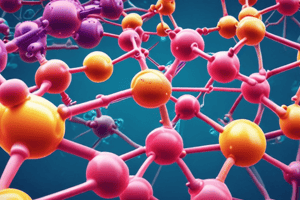Podcast
Questions and Answers
What is the primary focus of biochemistry?
What is the primary focus of biochemistry?
- Studying the structure of the Earth's atmosphere
- Analyzing the geology of mountain ranges
- Investigating chemical reactions within living cells (correct)
- Exploring underwater ecosystems
Which of the following is NOT an area where biochemists commonly contribute?
Which of the following is NOT an area where biochemists commonly contribute?
- Protein synthesis
- Metabolism
- Gene regulation
- Astronomy (correct)
What type of macromolecules are central to the study of biochemistry?
What type of macromolecules are central to the study of biochemistry?
- Proteins, carbohydrates, lipids, nucleic acids (correct)
- Minerals
- Gases
- Rocks
Which skills are essential for candidates applying for Biology Research Assistant roles?
Which skills are essential for candidates applying for Biology Research Assistant roles?
What do biochemists study in relation to macromolecules like proteins and nucleic acids?
What do biochemists study in relation to macromolecules like proteins and nucleic acids?
What is a common responsibility of Biochemistry Research Assistants in laboratories?
What is a common responsibility of Biochemistry Research Assistants in laboratories?
What is a key focus area in biochemistry related to cellular activities?
What is a key focus area in biochemistry related to cellular activities?
Which field benefits significantly from the principles of biochemistry?
Which field benefits significantly from the principles of biochemistry?
How does biochemistry contribute to biomedical research?
How does biochemistry contribute to biomedical research?
What role does intellectual curiosity play in biochemistry education?
What role does intellectual curiosity play in biochemistry education?
Why do students pursue advanced degrees in biochemistry?
Why do students pursue advanced degrees in biochemistry?
What broad applications does biochemistry have beyond biomedical research?
What broad applications does biochemistry have beyond biomedical research?
Flashcards are hidden until you start studying
Study Notes
Biology's Deep Dive Into Biochemistry
For life sciences enthusiasts who delve into the intricate web of molecular interactions—biochemistry awaits exploration. This discipline encompasses the chemical reactions and processes occurring within living cells, facilitating an understanding of biological functions at the atomic scale. Within the realm of biology, biochemists tackle essential problems related to metabolism, gene regulation, protein synthesis, and energy conversion through their unique blend of chemistry and biology perspectives.
Biochemists commonly occupy roles like Biology Research Assistants, where they contribute to the advancement of scientific knowledge and innovation while supporting laboratory teams. These roles often involve maintaining laboratory equipment, recording data, and executing experiments under the supervision of senior scientists. Successful candidates for such positions demonstrate proficiency in molecular biology, biophysics, bioorganic chemistry, and analytical techniques, alongside strong organization, communication, and teamwork skills.
Central to biochemistry lies the concept of macromolecules such as proteins, carbohydrates, lipids, nucleic acids, and polysaccharides. Each plays an integral part in sustaining life's functions, with biochemists studying their structure, function, biosynthesis, degradation, and interactions in healthy and diseased states. Key areas of biochemistry include:
- Energy metabolism and cellular respiration
- Protein folding, stability, and turnover mechanisms
- Gene expression regulation via transcription factors and epigenetics modifications
- Signal transduction networks governing cellular responses to environmental cues
Moreover, biochemical principles pave the way for understanding central issues in genetics, immunology, infectious diseases, neurology, and cancer biology, among others. Consequently, biochemistry serves as a foundation for biomedical research and wider applications in fields such as pharmacology, nutrition, and sustainable agriculture.
As with many specialized disciplines, biochemistry builds upon fundamental concepts acquired during formal education. Students gravitate towards advanced degrees because they equip individuals with the tools required to navigate complicated experimental designs and elaborate theories. The intellectual curiosity cultivated during training enhances employability across academia, private research firms, food production industries, clinical settings, and regulatory agencies.
In summary, biochemistry promises a rewarding pursuit for anyone fascinated by the microscopic universe driving life itself. Its interdisciplinary nature fosters problem solvers, critical thinkers, and lifelong learners poised to address modern challenges and discoveries yet unknown.
Studying That Suits You
Use AI to generate personalized quizzes and flashcards to suit your learning preferences.




